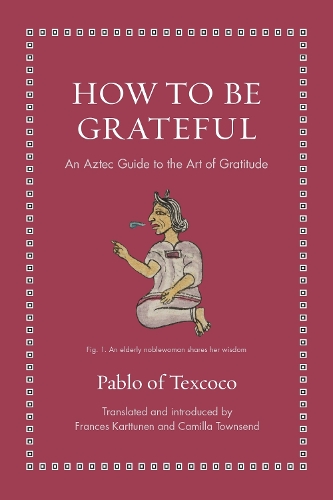
How to Be Grateful: An Aztec Guide to the Art of Gratitude
(Hardback)
Publishing Details
How to Be Grateful: An Aztec Guide to the Art of Gratitude
By (Author) Pablo of Texcoco
Edited and translated by Frances Karttunen
Edited and translated by Camilla Townsend
Princeton University Press
Princeton University Press
25th February 2026
United States
Classifications
General
Non Fiction
Self-help, personal development and practical advice
Physical Properties
Hardback
216
Width 114mm, Height 171mm
Description
A delightful Aztec work that has much to teach us about the value of giving thanks-to our contemporaries, our elders, and our ancestors
Centuries before anyone ever thought of keeping a gratitude journal, the Aztecs understood the profound value of being grateful. For generations, specially trained Aztec public speakers presented traditional dialogues at marriages, births, funerals, government ceremonies, and other important occasions. In these dialogues, people of different generations are imagined speaking to each other with mutual respect and gratitude across time, encouraging listeners to be grateful to their contemporaries, elders, and ancestors, as well as the divine, and reminding the living what they owe to future generations. In the late 1500s, one of these Aztec speakers, Pablo of Texcoco, recorded a collection of these dialogues, now known as the Bancroft Dialogues. In How to Be Grateful, Nahuatl- or Aztec-language specialist Frances Karttunen and Camilla Townsend, Cundhill History Prizewinning author of Fifth Sun: A New History of the Aztecs, present this fascinating work in an accessible translation that also features the original Nahuatl text on facing pages.
Although Pablo lived under Spanish rule, his parents, grandparents, and elderly teachers recalled the world before the Europeans arrived, and his dialogues, which delight in colorful metaphors and wry humor, offer remarkable insights into preconquest Aztec society, philosophy, and language. Pablo's dialogues tell readers they will be loved and honored today and by future generations if they repay those who have helped them-the living, the dead, and the divine. The living should pay these debts by helping their people and ensuring their future-by "paying it forward" as we say today.
Author Bio
Pablo of Texcoco was an Indigenous descendant of the Aztecs who lived in the central valley of Mexico in the second half of the sixteenth century. He was trained in the Nahua or Aztec art of rhetoric in the powerful city-state of Texcoco, which has been called the "Athens" of preconquest Mesoamerica because of its beautiful architecture and gardens and because of its people's reputation for a love of poetic songs. Frances Karttunen retired as Senior University Research Scientist at the Linguistics Research Center at the University of Texas at Austin, where she established the Early Mesoamerican Languages Project. Her books include The Art of Nahuatl Speech: The Bancroft Dialogues. Camilla Townsend is the Board of Governors Distinguished Professor of History at Rutgers University. Her books include the Cundhill History Prizewinning Fifth Sun: A New History of the Aztecs.
